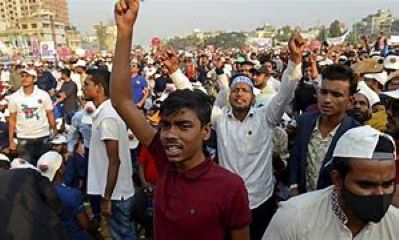
Bangladesh PM Hasina Flees, Military Takes Control
On Monday, Bangladesh Prime Minister Sheikh Hasina’s 15-year rule ended abruptly as she fled the country amid a month of intense protests.
In the wake of her departure, the military announced plans to set up an interim government.
Hasina had been trying to manage the nationwide unrest that began in early July but fled after a particularly violent day on Sunday that saw nearly 100 people killed.
“We demand a corruption-free Bangladesh where everyone can voice their opinions,” said Monirul Islam, a 27-year-old protester among the throngs outside the prime minister’s palace.
General Waker-Uz-Zaman, the head of Bangladesh’s army, appeared on state television to announce Hasina’s resignation and the formation of a caretaker government by the military.
“The nation has endured too much suffering, the economy has been devastated, and many lives have been lost — it’s time to end the violence,” Waker said, as crowds jubilantly overran and looted Hasina’s residence.
According to Bacchu Mia, a police inspector at Dhaka Medical College Hospital, at least 20 people were killed in Monday’s violence.
Millions across Bangladesh took to the streets, with many celebrating peacefully. Joyous crowds waved flags, some danced on tanks, and thousands breached the gates of Hasina’s official residence.
Channel 24 broadcast footage of people storming the compound, celebrating and looting furniture and books, while others lounged on beds.
Meanwhile, mobs also targeted the homes of Hasina’s close allies, attacked television stations that supported her, set fire to Awami League offices, and vandalized statues of her father, Sheikh Mujibur Rahman, a national hero.
“It’s time for accountability for the torture,” said protester Kaza Ahmed. “Sheikh Hasina is accountable for murder.”
Waker urged an end to the protests and promised to address “all the injustices.”
He indicated he would consult with the president to establish a caretaker government for the nation of about 170 million people, though it was unclear if he would lead it.
The military had previously supported Hasina’s government amid escalating unrest over civil service job quotas, which had broadened into demands for her resignation.
Waker revealed he had engaged with opposition parties and civil society leaders but not with Hasina’s Awami League.
A close source reported that Hasina, 76, escaped the country by helicopter. An Indian official confirmed that Hasina was “transiting” through India on her way to London.
The military also shut down Dhaka’s international airport on Monday evening, though no reason was given.
Protesters widely demanded that Hasina’s close associates remain in the country.
Michael Kugelman, director of the South Asia Institute at the Wilson Center in Washington, cautioned that Hasina’s exit created a significant power vacuum and that the country faced “uncharted territory.”
“The coming days are crucial for a smooth transition,” he said. “The focus now is on establishing an interim government to mitigate uncertainty and prevent further volatility.”
The unrest began over a quota scheme reserving government jobs for certain groups. Despite the scheme being reduced by the top court, protests intensified.
Sunday was the deadliest day of the unrest, with at least 94 fatalities as protesters and government supporters clashed, and security forces opened fire.
The total death toll since the protests began in early July has risen to at least 320, based on an AFP count from police, government officials, and hospital doctors.
In contrast to previous crackdowns, soldiers and police largely refrained from intervening during Sunday’s protests. On Monday, security forces had cordoned off Hasina’s office with barriers, but crowds overwhelmed them.
Bangladesh has a history of coups, with the military imposing an emergency in January 2007 and establishing a military-backed caretaker government for two years.
Hasina had governed Bangladesh since 2009, winning her fourth consecutive election in January amid allegations of using state power to suppress dissent and opposition.




Add comment